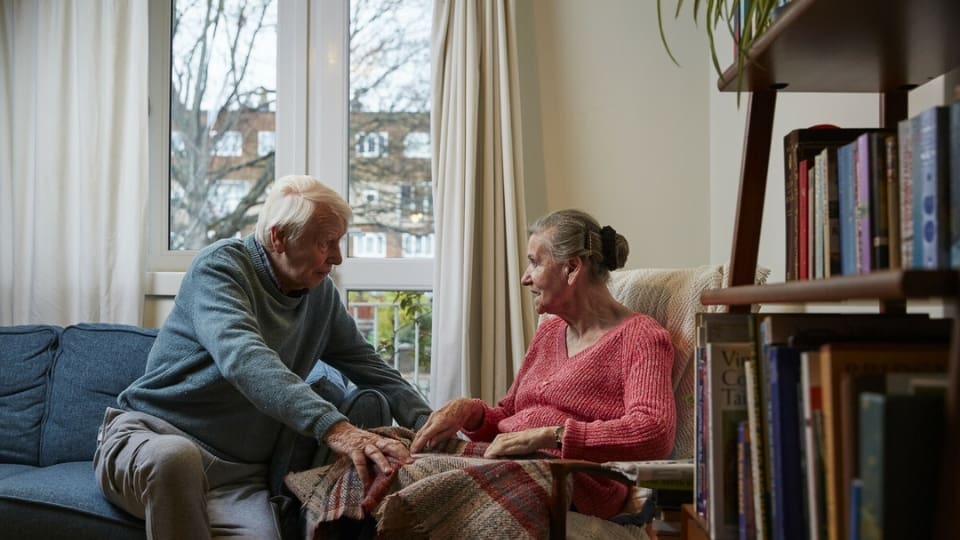
MPs support our calls for more dementia specialist Admiral Nurses
More than 4,400 Dementia UK supporters contacted their parliamentarians and invited them to our Time for a Cuppa event.

Consultant Admiral Nurse for Frailty, Kerry Lyons, answers your questions about delirium, falls and incontinence.
Frailty is a common condition for people with dementia, particularly in older people. The signs include weight loss, poor nutrition, hydration issues, fatigue, weakness, reduced physical activity and a general slowing down.
People who are living with frailty are more likely to experience delirium, falls and incontinence, and I am often asked questions about these common but worrying issues in my role of Consultant Admiral Nurse for Frailty.
It is important to understand and manage these conditions so that the person with dementia can access the right support and have a better quality of life.
Here are some common questions I get asked about these topics.
Delirium is a sudden and severe state of confusion that affects a person’s ability to think clearly. It can develop quickly, often within hours or days, and can fluctuate throughout the day.
People living with dementia are at higher risk of experiencing delirium. In fact, dementia is the single biggest risk factor for developing delirium.
The symptoms of delirium and dementia can overlap, making it challenging to distinguish between the two. However, whereas dementia usually develops gradually, over months or years, delirium typically develops rapidly and can significantly worsen the cognitive decline in people with dementia. Whilst delirium is usually not permanent, it can take a long time to recover from.
Delirium is more common in hospital settings, particularly among older adults. It can be triggered by various factors such as infection, medication side effects or being in an unfamiliar environment.
Some of the symptoms of delirium to look out for include:
If you spot any of these signs whilst visiting someone in hospital or generally feel something is not right, you should urgently inform the healthcare professionals caring for them.
Delirium can also affect people at home and in a care home, so it is important to look out for these signs in all settings.
People with dementia are more prone to falls. This increased risk is due to several factors, including physical weakness, changes in gait and balance, and cognitive impairments that affect judgment and spatial awareness.
If the person with dementia does fall, try to stay calm:
“In 2023, Mum suffered a number of falls, and after a traumatic 32-hour wait in A&E, she was in hospital for eight weeks. Admiral Nurse Kerry taught me so much about Mum’s advancing frailty and corresponding continence issues, weight loss, unmanaged pain, poor mobility and risk of falls. I was consumed with stress and worry, but Kerry was there for me.” – Shara, whose mother had vascular dementia
Talking about incontinence can be challenging, especially when the person with dementia feels embarrassed, does not recognise their condition or refuses help.
It is important to normalise the situation and always respect the person’s privacy and dignity. Let them know that many people experience similar issues. You might say, “Lots of people have accidents sometimes, and it’s okay.”
If a person with dementia does not recognise that they are incontinent, visual cues may help. Gently showing them the soiled clothing or bedding can help them to understand the situation without feeling accused.
“Anna had lost the ability to know exactly what she was doing; how to wipe herself, where to put the paper, how to wash her hands. She was a wife, mum and nurse, so cleanliness and hygiene were so important to her, but dementia took that away from her.” – Christine, whose daughter Anna had frontotemporal dementia
However, if the person refuses help, involving a healthcare professional or trusted family member may make them more receptive to advice. Offering choices, like types of incontinence product, can help them to feel more in control of the situation.
“Try not to be embarrassed about continence; everybody goes to the toilet. It’s just that people with dementia cannot always recognise how or where they should do it. It is not their fault, and they should always be treated with respect and dignity.” – Christine
Here are some gentle and supportive ways to start a conversation about incontinence:
“I’ve noticed you seem to be having a bit of trouble getting to the toilet on time. How are you managing with that?”
“Sometimes, people find it hard to talk about toilet issues. Have you experienced any difficulties lately?”
“It’s common for people to have accidents as they get older. Is this something you’ve been dealing with?”
“I want to make sure you’re comfortable. Have you had any problems with using the toilet?”
“If you ever need help with getting to the bathroom, please let me know. It’s nothing to be embarrassed about.”
Dementia specialist Admiral Nurses like me are here to help. Please call Dementia UK’s Helpline to speak to an Admiral Nurse who can provide information, advice and support with any aspect of dementia, free and in confidence.

More than 4,400 Dementia UK supporters contacted their parliamentarians and invited them to our Time for a Cuppa event.

How to host a dementia-inclusive Time for a Cuppa.

Ruby talks us through her working day supporting families affected by dementia in local communities.